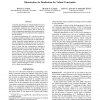Free Online Productivity Tools
i2Speak
i2Symbol
i2OCR
iTex2Img
iWeb2Print
iWeb2Shot
i2Type
iPdf2Split
iPdf2Merge
i2Bopomofo
i2Arabic
i2Style
i2Image
i2PDF
iLatex2Rtf
Sci2ools
AAAI
2015
2015
Binarisation via Dualisation for Valued Constraints
Constraint programming is a natural paradigm for many combinatorial optimisation problems. The complexity of constraint satisfaction for various forms of constraints has been widely-studied, both to inform the choice of appropriate algorithms, and to understand better the boundary between polynomial-time complexity and NP-hardness. In constraint programming it is well-known that any constraint satisfaction problem can be converted to an equivalent binary problem using the so-called dual encoding. Using this standard approach any fixed collection of constraints, of arbitrary arity, can be converted to an equivalent set of constraints of arity at most two. Here we show that this transformation, although it changes the domain of the constraints, preserves all the relevant algebraic properties that determine the complexity. Moreover, we show that the dual encoding preserves many of the key algorithmic properties of the original instance. We also show that this remains true for more gener...
| Added | 27 Mar 2016 |
| Updated | 27 Mar 2016 |
| Type | Journal |
| Year | 2015 |
| Where | AAAI |
| Authors | David A. Cohen, Martin C. Cooper, Peter G. Jeavons, Stanislav Zivny |
Comments (0)

